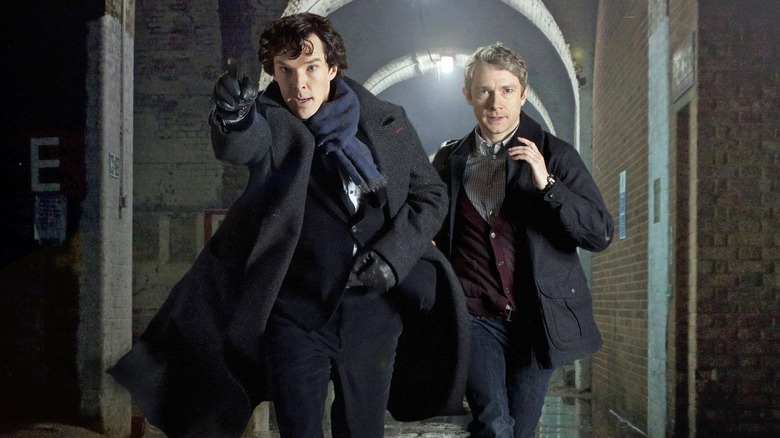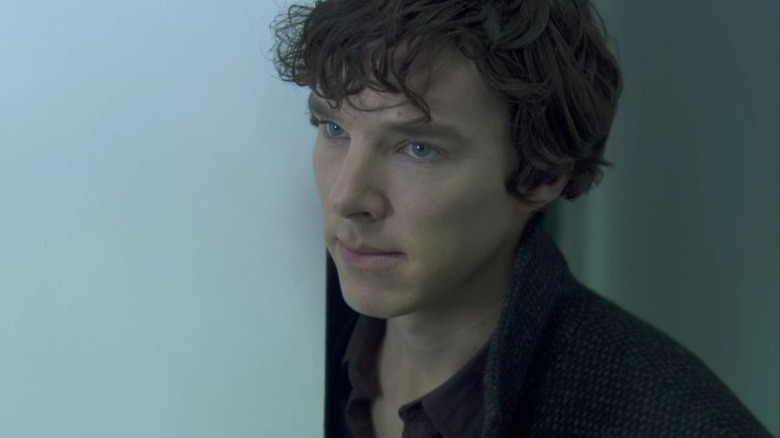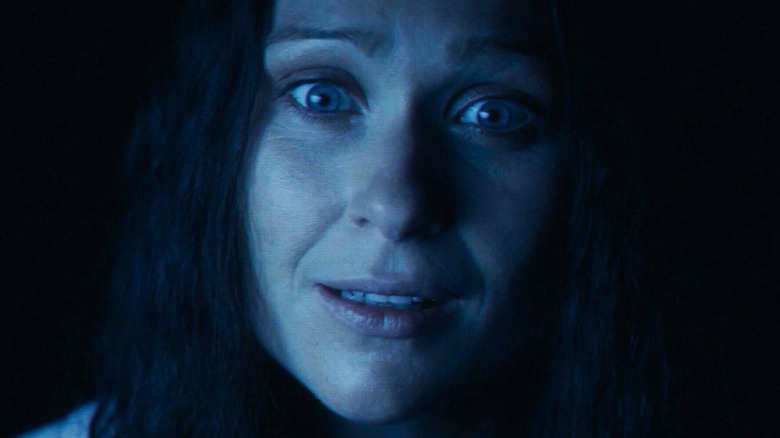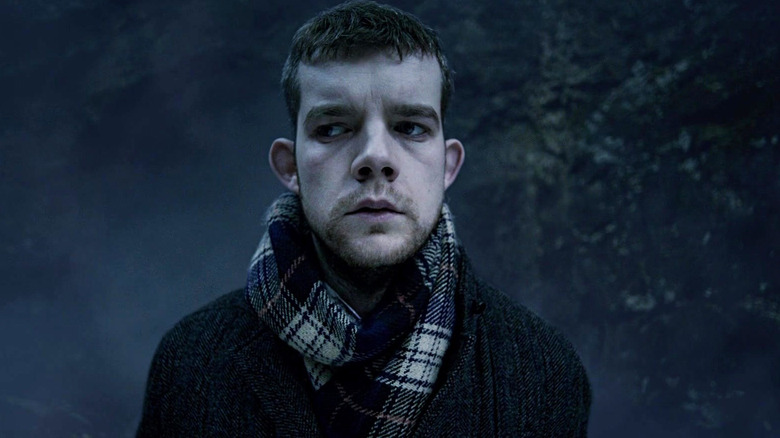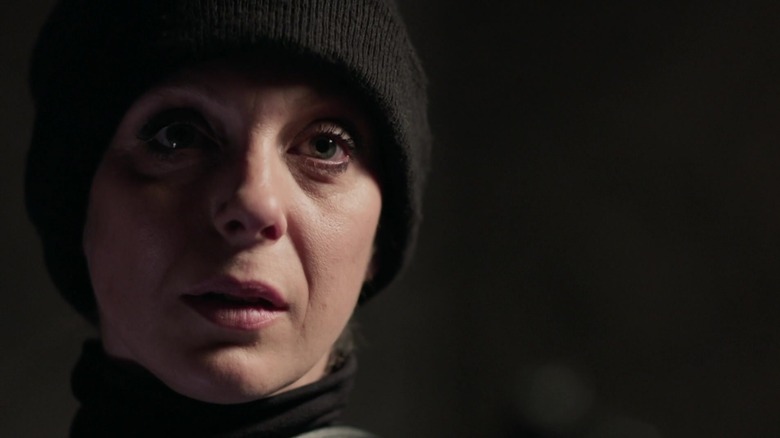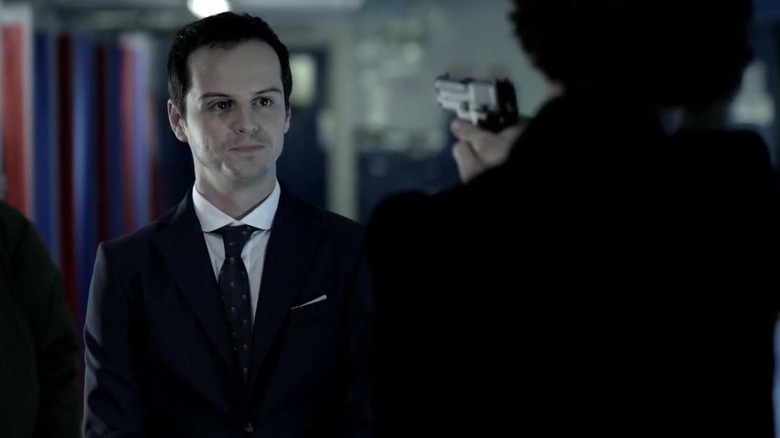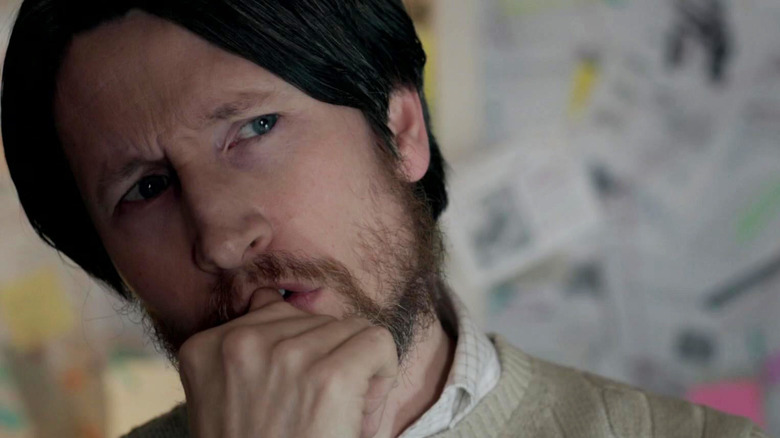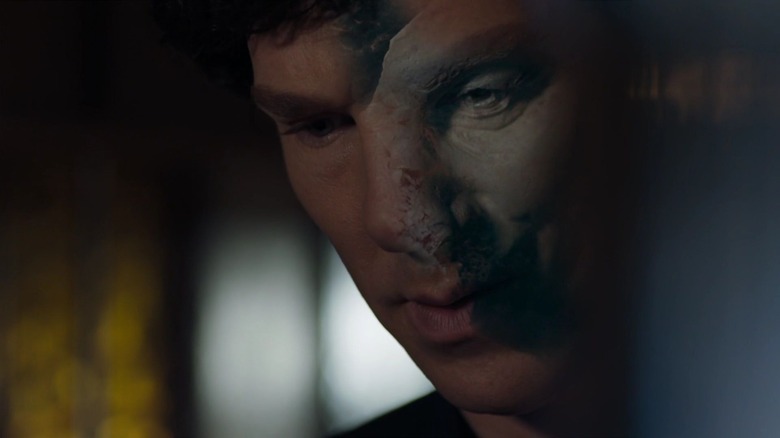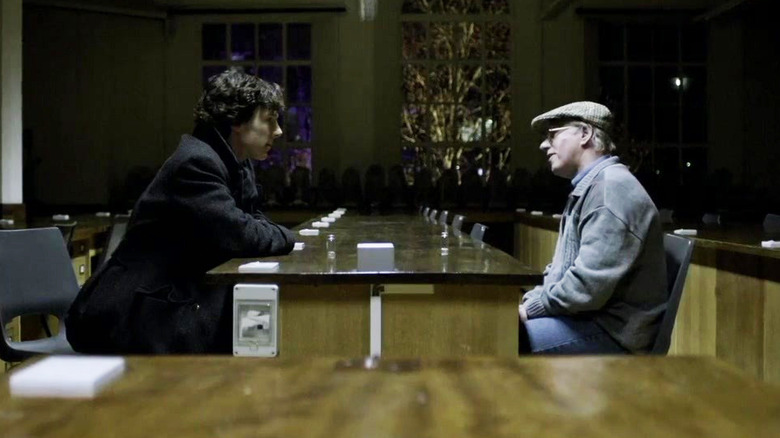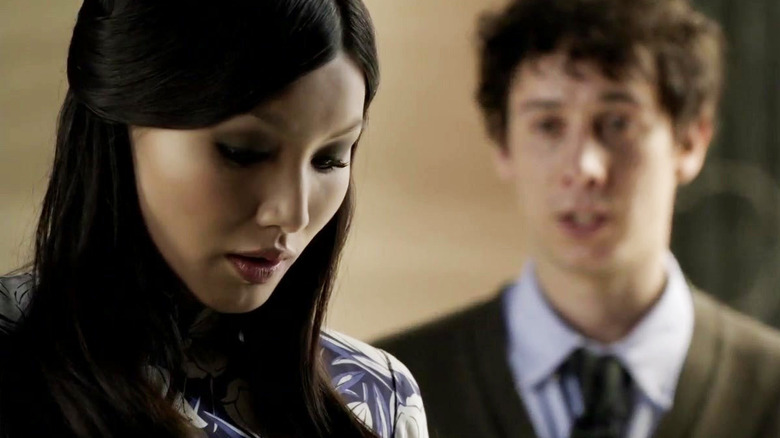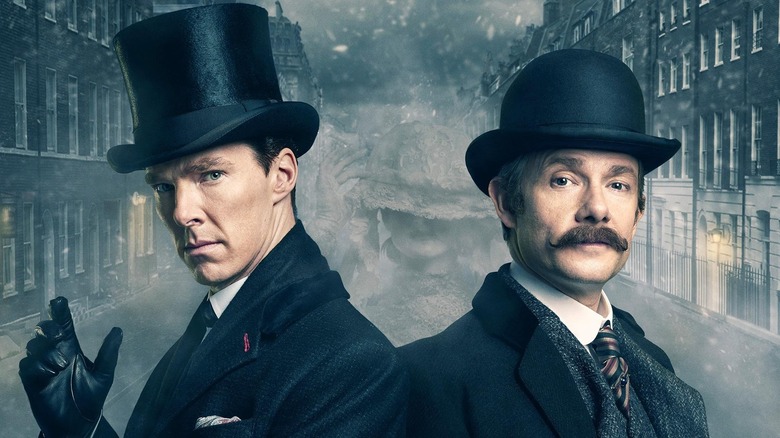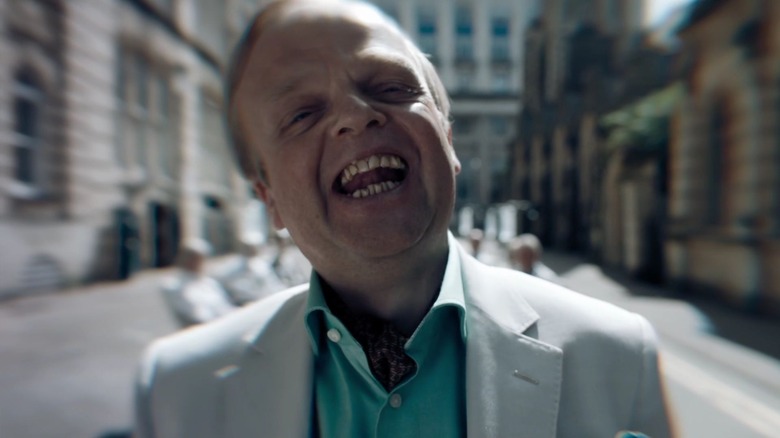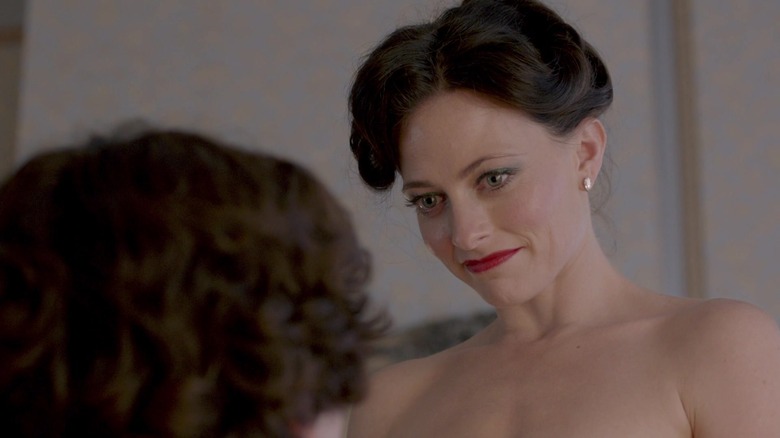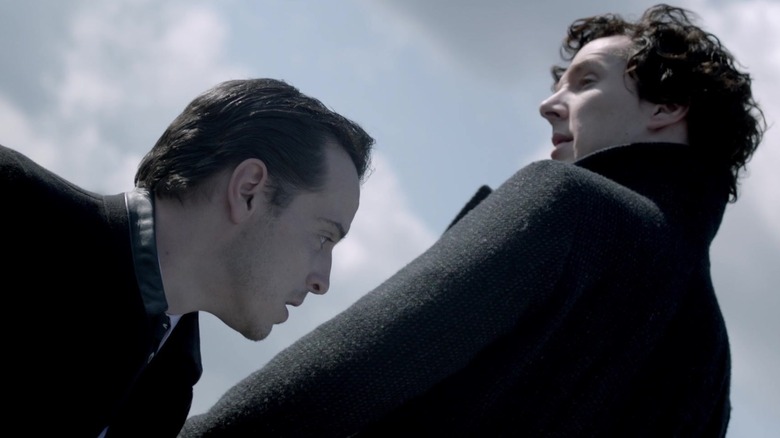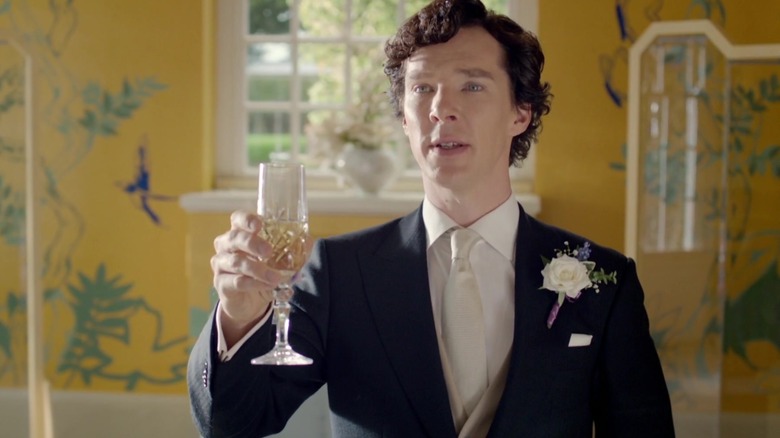Every Sherlock Episode Ranked Worst To Best
The game is on! Before Doctor Strange, Bilbo Baggins, or the Hot Priest, there was Sherlock Holmes, Dr. John Watson, and Jim Moriarty. It's hard to overstate the success and impact of BBC's "Sherlock" beyond merely turning its three leading men into bonafide stars. It set the precedent for modern detective stories and infused new life into the BBC's success across the pond. Though it drew ire from critics and fans alike in its later seasons, the world fell in love with Steven Moffat and Mark Gatiss' sharp writing, likable characters, and subtle homages to Arthur Conan Doyle's original works.
Ardent fans of the series may be skeptical about doing an official ranking. After all, the show has never had a "proper" finale. Moffat and Gatiss have even spoken about their enthusiasm to return to the show for a potential fifth season. However, Benedict Cumberbatch and Martin Freeman's busy schedules along with the passing of Mrs. Hudson's actress, Una Stubbs, have made it unlikely that the show will return anytime soon. Plus, "The Final Problem" is about as definitive an ending as we're ever gonna get, though the title may have given that away. With a few years of hindsight, now is as good a time as ever to look back on the once beloved, now divisive BBC adaptation to see which episodes hold up to scrutiny.
14. Honorable Mention: The unaired Pilot
Casual "Sherlock" fans may be surprised to learn that the version of "A Study in Pink" we know and love was not the creative team's first attempt. Back when the show was first greenlit, episodes were originally ordered at 60 minutes a piece, so an hour-long pilot was shot and completed. However, the BBC later requested the show be reformatted into 90-minute episodes, so they expanded the script and reshot the whole thing! The original pilot never aired but you can watch it as an extra on the Series 1 DVD.
While the plot and cast are very similar, it's a noticeably less stylized affair. Many of the flashy transitions and on-screen text effects are nowhere to be seen, though the bare bones of Sherlock's hyper-attention to detail still come through during deduction sequences. The performances are also less heightened, especially from Benedict Cumberbatch. This portrayal of Sherlock feels more straightforward, like he isn't so much having fun as he is just doing his job. It's less cocky, but also less entertaining as a result.
It's a fascinating case study into the "Sherlock" we may have gotten. Though it feels lower budget and lower effort, it's an absolute breeze in comparison to the show's exhaustive later seasons. When you strip away the show's at-times excessive style, you're still left with a compelling mystery. One does have to wonder if a more grounded sensibility would've kept the show from growing too big for its own britches.
13. The Final Problem (Season 4, Episode 3)
It's quite embarrassing to have to rank a show's (acting) finale as its weakest episode. It may be the last we see of our ol' Baker Street boys. Unfortunately, there just isn't any way around it. "The Final Problem" is the series' worst episode by a wide margin, one that exacerbates the series' worst qualities to the point that it becomes a borderline soap opera.
Most of its problems boil down to Eurus Holmes, a late-stage mega-villain and one of the sloppiest "gotchas" in all of television. "Sherlock" had always been a series obsessed with one-upping its own audience, oftentimes to an annoying degree. Eurus takes this frustration several steps further, actively upending Moriarty as Sherlock's prime nemesis and, by extension, two entire seasons' worth of mysteries. It's an insultingly rushed development that needed far more time than one episode to earn.
There's a good bulk of "The Final Problem" that feels like straight-up misery porn, pushing our characters to their emotional limits in ways that feel unpleasant, unfair, and wholly unlike the 11 episodes that came before it. Sherlock was often an unlikable character who would get away with a lot of emotional manipulation with no consequences, but there is nothing more manipulative than making Eurus such an unbelievably vile antagonist and then using her as a conduit for Sherlock to become "wise and humane." If this is the end of the show as we know it, it will remain more of a dirge than a requiem.
12. The Hounds of Baskerville (Season 2, Episode 2)
How did arguably the most well-known Sherlock Holmes mystery translate into one of the worst episodes of the series? By undermining itself in its final moments. Throughout the episode, we are told there is no "hound" of Baskerville. Even the innkeeper's literal hound proves to be a red herring. This is to help the audience deduce the big reveal, that a hallucinogenic drug (and a terribly impressive mouth-made barking sound) causes the terrifying visions of a monster at Baskerville. This is confirmed during the episode's climax when Dr. Frankland admits to murdering Henry's father himself, proving he never saw a hound in the first place.
Then, out of nowhere, the group is approached by an actual hound, fully rendered in poorly-aged CGI. You can even tell it's real because Watson shoots it point blank and we see its dead body up close. This is an absurd, last-second addition to the episode that dulls the impact of its psychological twist on the classic Holmes tale. Sadly, as we just discussed with "The Final Problem," "Sherlock" was no stranger to stripping its own groundwork for an unearned twist ending.
"The Hounds of Baskerville" is a decent episode of the show, all things considered. Russell Tovey commits to an emotionally challenging guest role and the fluorescent production design at Baskerville is a breath of fresh air for the series. But when you screw the pooch — literally — this poorly, it leaves a lot to be desired.
11. His Last Vow (Season 3, Episode 3)
Mary Watson was a wonderful addition to the ensemble, a step ahead like Sherlock but without the outright sociopathy. However, with "Sherlock," there always had to be a catch and, as we've already discussed a few times in this ranking, many of the twists and turns don't quite hit the same way upon revisitation. One of those is Mary's previous life as an elite assassin. Even with several hints that she knows more than she lets on, the whole ordeal has a "this is why we can't have nice things" air to it. Just let John be happy, for goodness sake!
Charles Augustus Magnussen is the episode's real selling point, an absolutely reptilian creature that made for a strong new entry into the show's rogues gallery. The death of Moriarty left big shoes to fill but Magnussen's complete disregard for human decency, along with his wealth of knowledge regarding Sherlock's vulnerabilities, made him a formidable opponent.
Alas, his potential feels squandered in another example of "Sherlock" pushing things just a tad too far beyond the realm of plausibility. Do you really expect us to believe Magnussen can remember all of that tea from memory? We're almost glad Sherlock disposed of him with one measly gunshot. After all that fuss, Moriarty's return certainly did not affirm any additional confidence. What were they to do with him after three whole seasons? As it turns out, not much of value.
10. The Great Game (Season 1, Episode 3)
When you first start binging through Sherlock, the theatrics can feel incredibly enthralling. After two strong mysteries, "The Great Game" is an absolute barnburner of a finale, presenting four mini-mysteries for the price of one. However, and we really don't mean to sound like such a broken record, the show's twistiness can all feel a bit tedious. Can a "Sherlock" finale ever be straightforward?
The show, and frankly any mystery, is at its best when it lays out all of the clues so that the viewer can play along. Steven Moffat and Mark Gatiss always held a tight leash in that respect, but "The Great Game" moves at such a fast clip that there isn't time to process the proceedings. The script relies heavily on Sherlock's borderline deus ex machina abilities to move the plot forward and, while it may be fun to see Sherlock deducing clues, when the audience can't do many deductions of their own, it all feels a bit weightless.
Thankfully, Andrew Scott's deliciously chilling portrayal of Jim Moriarty wraps the episode up in a chilling bow. Exacting Lector-like precision in each and every line delivery ("I will burn the heart out of you" still haunts us to this day), Scott's electric performance is one of the series' highlights. The episode's final standoff is still masterful all these years later, capping off the finale with one of the only justified cliffhangers in all of television.
9. The Empty Hearse (Season 3, Episode 1)
The series' return in the aftermath of Sherlock's "death" had several inherent mysteries. How did Sherlock survive the fall? Where the heck has he been? What does the world look like now? All of these questions are answered in some of the show's most entertaining world-building. Anderson and his titular fan club are an obvious highlight, criticisms of queerbaiting aside, but it's the scene in the restaurant that takes the cake. "Sherlock" is at its strongest when it gives into its silliness and nothing is quite as funny as Benedict Cumberbatch with an overwrought accent and a drawn-on mustache.
The majority of the episode is fairly breezy until the third act, in which the episode's terrorist-syndicate subplot leads to a contrived climax. It does bring a fractured Sherlock and Watson closer together, but it's a tangential piece of setup for Magnussen before he's even introduced. The syndicate made for a proper way to bring Sherlock back from the dead, but it doesn't hold much water outside of that. They could have been done away with in one quick whiff and our time would have been spent more efficiently.
Watching this episode always begs the question: How could anybody forgive Sherlock for pulling such a ridiculous stunt? This episode stretches Sherlock's unlikability (and Watson's forgiveness) to its thinnest possible lengths. However, it speaks to the show's incredible balancing act that, with the right levels of charm and heart, even Sherlock's most unlikable moments can make for decent television.
8. The Six Thatchers (Season 4, Episode 1)
The first half of "The Six Thatchers" is such a pleasant distraction. Sherlock is tasked with a case as Sherlockian as they come: six-of-a-kind busts being targeted by a mysterious burglar. It's some of the show's best and most straightforward sleuthing. It almost makes you hopeful that, despite the inevitable ordeal concerning Moriarty, maybe we'll get one solid mystery out of this season. Turns out we would, just not in this episode.
About halfway through, as the mystery of the busts is about to be revealed, we see the A.G.R.A. thumb drive. But we saw it burn in a fire last season! How could it just suddenly reappear? Well, leave it to "Sherlock" to dig up an old grave, one that already felt tiresome in "The Last Vow" and now feels even more tangential to actual mystery-solving. The Thatchers themselves were already a buried lede after the show's inciting case, the tragic death of young Charlie Welsborough. Now we're gonna do two buried ledes at once?
The episode's most glaring problem comes right at the end when Mary sacrifices herself to keep Sherlock from being shot, an admittedly clean callback to her shooting him in "The Last Vow." It's a classic example of fridging, sacrificing a compelling character to service the leading male one. Admittedly, it does service him well (another reason why this episode sits in the shadow of its successor), but it does ring a bit hollow in hindsight. But hey, at least we have doggo Toby. Sweet, sweet Toby.
7. A Study in Pink (Season 1, Episode 1)
As a show grows and evolves, the pilot will often wind up sitting in the shadow of later episodes. "Sherlock" would go on to raise the bar far beyond what is achieved in "A Study in Pink," but we have to give credit where credit is due. The actual pilot remains a brazen introduction from its first frames, confident in its reimagining of a beloved source material and bolstered by a strong cast of characters with charming chemistry. Before Moriarty began to over-complicate matters, all we had was a humble expat, an excitable detective, and the game.
This premiere does a fair amount of heavy lifting near effortlessly. The first two acts not only establish Sherlock's character web but do so by entangling it in the actual mystery. It's a clever balancing act that keeps the show moving while also doing some good ol' fashioned world-building. It's funny too, which isn't for nothing. The entire series has a sharp wit, but this episode still has some of the show's most quotable lines ("I'm not a psychopath, Anderson. I'm a high-functioning sociopath. Do your research.")
The third act is where things get a bit dragged down. Sherlock and John's wild goose chase around the streets of downtown London was added when expanding upon the original unaired pilot and it shows. It's a clear attempt to misdirect the audience but it feels sloppy. It's a minor grievance for an otherwise enticing first impression.
6. The Blind Banker (Season 1, Episode 2)
I suspect plenty of "Sherlock" fans would not go up to bat for "The Blind Banker," an episode that often gets shrugged off as the awkward middle child of the first season. On the contrary, it's the best episode of the first season precisely because it bears the least responsibility. "A Study in Pink" had to introduce everything in a whirlwind, while "The Great Game" needed to deliver on the season's big bad. "The Blind Banker" simply had to provide us with a classic Sherlock mystery, which it does exceptionally well.
Unlike "The Great Game," the audience actually gets the time to consider all of the clues and play along with the mystery, which itself has incredibly high stakes from the jump. The episode immerses us in the shrouded world of the Black Lotus, a Chinese crime syndicate that smuggles antiquities and communicates in code. It's incredibly atmospheric and unpredictable, instilling the episode with a constant sense of real danger, something "Sherlock" struggled with in later seasons.
This danger is also achieved thanks to a pre-"Crazy Rich Asians" Gemma Chan who provides arguably the strongest supporting guest turn in the whole series. Reserved but resilient when faced with her demons, she also grounds the story but with a personal touch. By the end of the episode's nail-biting, death-defying climax, it's easy to see the potential of what "Sherlock" could have been had they committed more to high-flying but emotionally grounded mysteries.
5. The Abominable Bride (special episode)
Steven Moffat and Mark Gatiss pay tribute to Arthur Conan Doyle in countless ways across the entire series but "The Abominable Bride" took it to a whole new level, throwing it back to the novels' original setting of Victorian London. The technical makeover was par for the course — everything, from the lighting to the sets to the costumes, is pitch perfect (fatsuit notwithstanding) — but even the writing is period-appropriate. It particularly grounds Benedict Cumberbatch's performance in a way that feels less indulgent than a normal episode.
Despite throwing it back, "The Abominable Bride" also felt like a step forward in terms of the show's visual prowess. There's plenty to ogle over in the frame, but the cinematography itself feels crisper. Several low-lit hallways make for deep contrast and subtle details can be taken into account thanks to a higher bit of depth. Ironically, this period special is the first episode where "Sherlock" and its visual language caught up to the modern day, something it would take into Season 4 as well.
There is the elephant in the room, that being the episode's bait-and-switch. It was too good to be true that this entire retro stunt was simply for fun. However, even with the bizarre flash-forwards, the central mystery is still engaging from start to finish. Its supernatural twist felt like new territory for the series, culminating in a way that not only aids the period world-building but also speaks to modern-day "Sherlock" with a surprisingly coherent sentiment.
4. The Lying Detective (Season 4, Episode 2)
It's as good a time as any to commemorate the cast of "Sherlock," an off-the-charts ensemble that kept adding new talents until the very end. Every performance had value even if the writing failed to properly serve them (see: Eurus, Magnussen), but the show reached new heights when the two were in sync. This brings us to Toby Jones as Culverton Smith, one of England's finest character actors providing one of the series' best antagonists.
Jones always had the physical disposition of a villain (sorry Toby), but every line and laugh is utterly revolting here. Culverton's ability to hide in plain sight makes it all the more compelling, if at times hilarious ("Cereal Killer"), but Sherlock's drug use makes it easy to believe our favorite detective is delusional. Despite the means of "The Six Thatchers," the ends are admittedly resonant; Sherlock is at his lowest point following Mary's death and, when combined with the show's continued experiments in visual storytelling, his descent into the case makes for a tragic, psychological game of cat and mouse.
It all comes to a head in the episode's stirring climax inside Sherlock's hospital room. Jones sheds his character's artifice so well that it easily outshines the script's incessant need to make Sherlock eight steps ahead of every single plot progression. It's one of the few episodes in which the show's self-satisfied surprises, even this episode's eye-rolling cliffhanger, were not enough to spoil the broth.
3. A Scandal in Belgravia (Season 2, Episode 1)
There is a lot to like in "A Scandal in Belgravia," easily the best season-opener in the show's history, but a lot of it boils down to, again, a great character and performance: Lara Pulver as Irene Adler. It's another bold swing of reinvention, characterizing Adler as a seductress and dominatrix, but it works at full thrust thanks to Pulver's commitment. Not only does she match wits with Benedict Cumberbatch in every scene but does so with sex appeal, though never too much to overshadow the cracks in her facade. Their mutual affection adds deeper layers to Sherlock as well, a character who was in dire need of a female counterpart that could genuinely challenge his romantic coarseness.
"A Scandal in Belgravia" is another episode that hones in on the show's silly sensibilities, best represented by Sherlock and John's disbelief when first interacting at Buckingham Palace. That energy permeates every humorous interaction in this episode, including when Irene and Sherlock first meet. It's the kind of wit we were promised in "A Study in Pink" that sadly fell to the wayside in later seasons. This episode also showcased a step up in production value and visual imagination from seasons one to two, such as when Irene and Sherlock recount the mysterious gunshot from earlier in the episode. The transition from the scene of the crime to Sherlock's bedroom remains one of the series' best moments.
2. The Reichenbach Fall (Season 2, Episode 3)
We've spent a lot of time taking the piss out of the finales, so how could one of them rank so high on this list? Well, when you let Andrew Scott run wild as Moriarty, you're bound to have something left to show for it. The man devours the scenery every chance he gets; the opening sequence in particular is one for the ages. However, Scott also gets to play it straight as Richard Brook, his fake alias, and it's a subversion so juicy you'll genuinely think you've been fooled.
This scene speaks to why "The Reichenbach Fall" is one of the show's best mysteries. Many of the show's characters have been skeptical of Sherlock's intentions since the first episode, but all it took was one mad genius for everyone to start believing Sherlock is, at best, a fraud and, at worst, a murderer. Our consulting detective becomes his own client. The audience has trouble piecing things together because Sherlock himself can't even keep up. This framing device — both literally and figuratively — makes for one compelling conflict.
By the time we get to the episode's final standoff on the rooftop, it feels as though Sherlock has been outsmarted for what feels like the first time. It culminates in Sherlock's "death," a genuinely heartbreaking scene that speaks to how much we all adore these characters. This would all be patched up in "The Empty Hearse," but sentiments like this are extraordinary to witness, even if for a moment.
1. The Sign of Three (Season 3, Episode 2)
Many consider "The Sign of Three" to be the black sheep of the series, making it all the more fitting that it's also the best of the series. It's arguably the most self-contained episode of the show and a great example of the potential "Sherlock" had as a series coming out of its second season. After "The Empty Hearse" set the game back into motion, "The Sign of Three" felt like a fun, one-off adventure that was inconsequential to any larger story but still consequential for its characters and their relationships. After seven episodes of exhaustingly grand plotting, "The Sign of Three" represented a more episodic approach to the show's storytelling that was a breath of fresh air and a jolly fun one at that.
The episode also happens to be the funniest of the series by far. Sherlock taking on the role of best man at John and Mary's wedding leads to various hilarious scenarios, including his pairing with the maid of honor Janine. Filled with witty banter and tight comic editing, this episode is filled with nonstop laughs that keep everything silly, much to the show's benefit. The episode isn't without its thrills though, utilizing the wedding as a clever framing device for a fascinating double-dose of mysteries that are, ahem, married in a high-stakes climax ("Vatican cameos!"). In one of the few times "Sherlock" genuinely earned a "gotcha," "The Sign of Three" felt like the show at the height of its powers.
